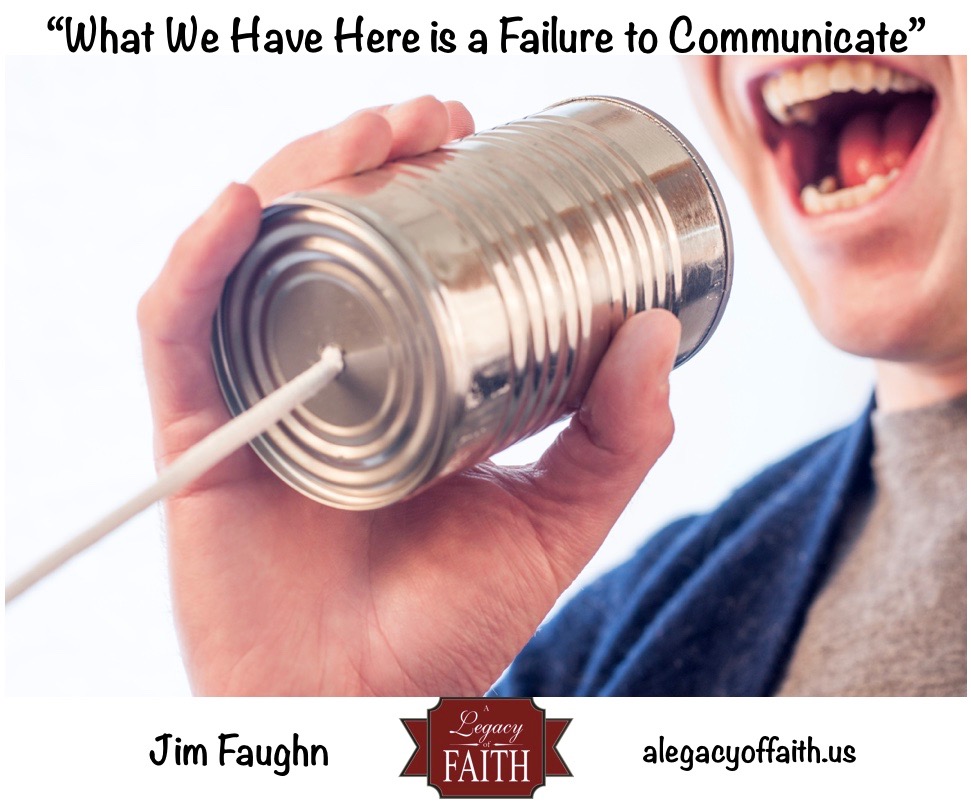“What We Have Here is a Failure to Communicate”

Those of us of a certain age may remember that line from the movie Cool Hand Luke. I’m wondering, though, if it is not more than a memorable line from a movie. I’m wondering if a failure to communicate may be at the heart of many of the marital (and family) problems today.
A few years ago, I wrote a book about families entitled God Give Us Christian Homes. I chose the line from the movie as the title of this post as the title of one of the chapters in the book.
One part of that chapter dealt with what I consider to be some barriers and/or roadblocks as we try to communicate with one another. What follows below is a sort of CliffsNotes version of that part of the chapter. Each of these is fleshed out more in the book, but, perhaps, this will give you an idea about what I see as some real problems in communication. Along with that, I’ve included from that chapter some suggestions I made that might help us to communicate better.
The barriers and/or roadblocks I wrote about were:
DUSTING OFF YOUR CRYSTAL BALL
A real barrier to communication is erected when one person thinks he or she knows what the other person is thinking, what they are going to say before it is ever said, and/or their emotions. It is hard to tell somebody something when they’ve already decided for themselves what you have to say and have, in fact, already begun to work on a response.
PLAYING DODGEBALL
The woman that Jesus met at the well in Samaria was a great dodgeball player. As you read the account of the conversation that Jesus had with her, it is easy to observe all of the efforts she made to change the subject and, in fact, to try to put Jesus on the defensive (cf. John 4).
Dodgeball is still being played and it is not confined to grade school physical education classes. Husbands, wives, parents, children, and all members of any family often try this tactic to keep from really engaging in conversation.
BEING AN HISTORIAN
You may have heard about the fellow who was complaining about his wife becoming historical every time there was a disagreement. His friend tried to correct him by saying, “Don’t you mean hysterical?” “No,” the man replied, “I mean historical. She brings up everything I’ve ever done wrong in the past!”
Communication will never be what it can be when one or more of the parties involved insist on being “historical.” The situation at the time is what needs to be dealt with.
LIGHTING THE FUSE
Most of us, especially in family situations, know what issues, words, and/or ideas to avoid. How many conversations have been destroyed because somebody refused to resist the temptation to light the fuse on a firecracker we know will go off?
“Let your speech always be with grace, seasoned with salt…” (Col. 4:6). This admonition leaves little room for something that we know will ignite a situation.
“IT AIN’T ME, BABE”
Sonny and Cher weren’t the only ones to use those words. At least, they weren’t the only ones to have that idea.
The blame game has destroyed many conversations and relationships and needs to be avoided. This game has been around for a long time, hasn’t it? In the garden, Adam blamed Eve (and God) and Eve blamed the serpent.
***
The suggestions I presented that, hopefully, will help families to communicate better were:
2 ARE MORE THAN 1
Now that you know that I am a real math expert, let me explain what I mean by that. The thought is certainly not original with me that God gave us two ears and one mouth. Maybe He was trying to tell us something.
Far too many people think they are communicating only when they are talking. This is far from the truth. Good communication will involve listening as well; maybe a lot more listening than talking.
Repeatedly, during His earthly ministry, Jesus told the Jews, “You say…” (cf. Matt. 15:5, 16:2, etc.). To be sure, He was usually in the process of correcting some of their misunderstandings or misinterpretation of scripture. At the same time, though, He let them know He had been listening to what they had been saying.
THE EYES HAVE IT
In some meetings where votes are taken, the ayes have it. In communication, often the eyes have it.
Those who are experts in the field of communication inform us that we listen as much with our eyes as we do with our ears. Whether it is family members or others we are talking about, we need to look at them when they are speaking to us and when we are speaking to them.
HONESTY DOES NOT HAVE TO BE BRUTAL
“Let me be brutally honest.”
That sentence usually precedes something that is very unpleasant. Hurt feelings, broken hearts, and/or broken relationships have been some of the results of somebody being “brutally honest.”
The Bible informs us that we are to be about “…speaking the truth in love…” (Eph. 4:15, emphasis added). How we say something can have as great an impact as what we say.
REPLACE THE TUBE & THE TABLET WITH THE TABLE
Modern families eat on the run and often eat separately. If, on a rare evening, all of the family members find themselves at home, they might be found eating while watching television or fiddling with some electronic device.
There is a real need in our society to use the dinner table for something other than a nice piece of furniture to be admired. There is a need for the family to sit as a unit around the table with no distractions and share their days and their lives.
Some of the best memories I have of the house in which I was reared and, then later, of the houses in which our children were reared involve eating together. The food was always good, but one can get at least a decent meal at a lot of places.
What is memorable and now missed is that our children are no longer at home and my parents have passed away is the time we had as a family to share more than a meal. We got to share in each other’s lives.
***
So; there you have it. At least you have some of what I suggested in that chapter. Maybe you have some things you would add to these ideas.
To Receive Every Post from A Legacy of Faith through Email for Free, Click Here
AUTHOR: Jim Faughn


